PNG
How citizen scientists are uncovering the secret lives of blue whalesKelly Ng
BBC News

Drone footage of pygmy blue whales off Timor Leste coast
For about two months each year, fisherman Faustino Mauloko da Cunha and his son Zacarias spend most of their days in a dugout canoe out at sea in the South Pacific Ocean.
Armed with binoculars and a telephoto camera, they watch the cobalt waters for one of its great treasures - pygmy blue whales.
When there is a sighting, it’s all systems go.
A team based in the da Cunha's village - called Subaun - dispatches a drone. Then the team’s leader, Australian marine ecologist Karen Edyvane, guides the drone operator to take the best photographs. When the drone returns, the team reviews the pictures, taking notes on a white board.
It's a small and thrifty operation in Timor-Leste, which is part of an archipelago that lies between South East Asia and the South Pacific. But it has generated a wealth of information about pygmy blue whales - one of the largest animals on earth, whose vast habitats and elusive nature make them challenging to study.
These citizen researchers, all of them locals, have spotted nearly 3,000 pygmy blue whales over the past 10 years - Prof Edyvane considers that a “truly extraordinary” number.
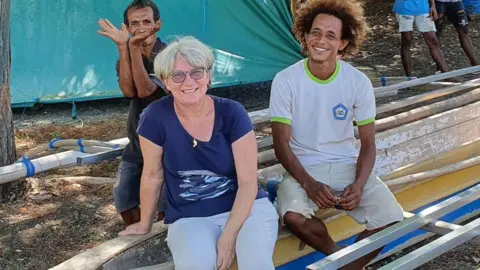
Mario Cabral
Faustino Mauloko da Cunha (left) and his son Zacarias with Professor Karen Edyvane in Subaun
Timor-Leste has one of the world’s highest concentrations of marine mammals.
During the migration season - October and November - hundreds of pygmy blue whales pass through the country’s waters as they make the epic journey spanning thousands of kilometres from southern Australia into the Banda Sea that lies to the north of Timor-Leste.
But the area has been under-researched, says Prof Edyvane, who started the monitoring programme in 2014.
During whale season over the past decade, she has based herself in Subaun, about 50km (31 miles) from the capital Dili, working with fishermen, students and dive tour operators to document the cetaceans.
They have documented "some of the lesser known, intimate reproductive behaviours of blue whales, some for the very first time," says Prof Edyvane, who lectures at the Australian National University and Charles Darwin University.
In July, for instance, the team captured underwater footage of a mother nursing her calf, offering a glimpse into the species’ reproductive behaviours, which have remained largely unknown.
"It’s very, very exciting,” she adds.
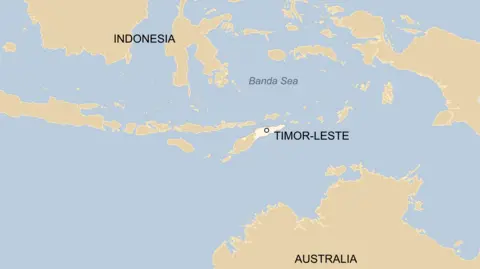
Hundreds of pygmy blue whales make an epic annual journey from southern Australia, past Timor-Leste, and into the Banda Sea
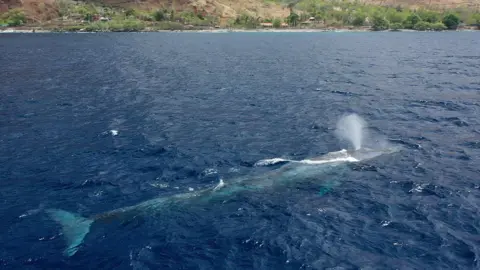 Zacarias da Cunha
Zacarias da Cunha
The citizen researchers, all of them locals, have spotted nearly 3,000 pygmy blue whales over the past 10 years
Advertisement
The project started as a Facebook group, inviting local volunteers to spot and document the lives of pygmy blue whales.
Prof Edyvane trained them on surveying methods and hired professionals to teach them how to use telephoto cameras and drones so that they could conduct aerial and boat surveys.
“When locals living along the coast see the whales swimming by, they will post pictures on Facebook and WhatsApp. Updates come on a real-time basis and when someone shares something, everyone gets very excited,” Prof Edyvane says.
In 2016, the team worked with a dive tour operator to launch the first whale-watching tour.
It was only last year that they set up a “research station” outside the da Cunha’s village home - photos show a simple hut overlooking the bay. Outside are two tables, plastic chairs and white boards mounted on the hut's walls.
 Karen Edyvane
Karen Edyvane
The research station at the da Cunha's village home
During this year's whale season, undergraduates from the National University of East Timor gathered at the research station to help with the sightings.
Even such a basic structure has made the task easier.
“We’re able to monitor all day and all night," Prof Edyvane says. "We’ve also been able to get the most incredible footage. The whales come in so close sometimes we can actually hear their blows."
Citizen researchers like these have become powerful eyes and ears on the ground for marine scientists, says wildlife scientist Vanessa Pirotta.
“The combination of people having access to tools like drones and social media means we have insights into things that are happening while we may be behind the desk writing grants to fund our work,” she said.
The increase in research activity in Subaun has also led to a rise in tourism.
The demand for whale-watching tours has increased, diving instructor Cassio Schumacher tells the BBC, adding that these tours are “booked up years in advance”.
Local non-profits have warned of the risks of unregulated whale tourism and the government has said it intends to use Prof Edyvane's research to “fully protect and conserve" the marine life that pass through Timor-Leste’s waters.
Faustino Mauloko da Cunha (left) and his son Zacarias with Professor Karen Edyvane in Subaun
Timor-Leste has one of the world’s highest concentrations of marine mammals.
During the migration season - October and November - hundreds of pygmy blue whales pass through the country’s waters as they make the epic journey spanning thousands of kilometres from southern Australia into the Banda Sea that lies to the north of Timor-Leste.
But the area has been under-researched, says Prof Edyvane, who started the monitoring programme in 2014.
During whale season over the past decade, she has based herself in Subaun, about 50km (31 miles) from the capital Dili, working with fishermen, students and dive tour operators to document the cetaceans.
They have documented "some of the lesser known, intimate reproductive behaviours of blue whales, some for the very first time," says Prof Edyvane, who lectures at the Australian National University and Charles Darwin University.
In July, for instance, the team captured underwater footage of a mother nursing her calf, offering a glimpse into the species’ reproductive behaviours, which have remained largely unknown.
"It’s very, very exciting,” she adds.

Hundreds of pygmy blue whales make an epic annual journey from southern Australia, past Timor-Leste, and into the Banda Sea
 Zacarias da Cunha
Zacarias da CunhaThe citizen researchers, all of them locals, have spotted nearly 3,000 pygmy blue whales over the past 10 years
Advertisement
The project started as a Facebook group, inviting local volunteers to spot and document the lives of pygmy blue whales.
Prof Edyvane trained them on surveying methods and hired professionals to teach them how to use telephoto cameras and drones so that they could conduct aerial and boat surveys.
“When locals living along the coast see the whales swimming by, they will post pictures on Facebook and WhatsApp. Updates come on a real-time basis and when someone shares something, everyone gets very excited,” Prof Edyvane says.
In 2016, the team worked with a dive tour operator to launch the first whale-watching tour.
It was only last year that they set up a “research station” outside the da Cunha’s village home - photos show a simple hut overlooking the bay. Outside are two tables, plastic chairs and white boards mounted on the hut's walls.
 Karen Edyvane
Karen EdyvaneThe research station at the da Cunha's village home
During this year's whale season, undergraduates from the National University of East Timor gathered at the research station to help with the sightings.
Even such a basic structure has made the task easier.
“We’re able to monitor all day and all night," Prof Edyvane says. "We’ve also been able to get the most incredible footage. The whales come in so close sometimes we can actually hear their blows."
Citizen researchers like these have become powerful eyes and ears on the ground for marine scientists, says wildlife scientist Vanessa Pirotta.
“The combination of people having access to tools like drones and social media means we have insights into things that are happening while we may be behind the desk writing grants to fund our work,” she said.
The increase in research activity in Subaun has also led to a rise in tourism.
The demand for whale-watching tours has increased, diving instructor Cassio Schumacher tells the BBC, adding that these tours are “booked up years in advance”.
Local non-profits have warned of the risks of unregulated whale tourism and the government has said it intends to use Prof Edyvane's research to “fully protect and conserve" the marine life that pass through Timor-Leste’s waters.
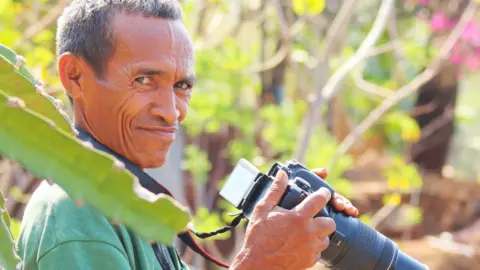
Karen Edyvane
Faustino Mauloko da Cunha spends most of his day out with this camera during whale-spotting season
Prof Edyvane believes that with regulation, whale tourism has the potential to create jobs and grow Timor-Leste’s economy.
The country is one of the poorest in the world, where average annual incomes in cities hover around $1,500, according to the International Monetary Fund. In Subaun, most villagers work as subsistence fishermen and farmers, earning just about $600 to $900 a year.
The da Cunha family has now started preparing meals from local produce and the day’s catch for the students and tourists - an additional source of income.
“We enjoyed having the guests around and will love to do it again," Faustino, 51, tells the BBC on a WhatsApp video call. "We will make it a better experience [next season]."
His son, Zacarias, has also been contracted to provide drone services for the project. Prof Edyvane says she plans to train him to give talks about whales in English.
The 26-year-old says what he appreciates is that the visitors are learning to protect the area: “The university students learn fast and well to defend this area."
As for the tourists, he says the locals are happy to teach them. "We remind tourists not to swim with the whales but instead watch them from a distance."
Faustino Mauloko da Cunha spends most of his day out with this camera during whale-spotting season
Prof Edyvane believes that with regulation, whale tourism has the potential to create jobs and grow Timor-Leste’s economy.
The country is one of the poorest in the world, where average annual incomes in cities hover around $1,500, according to the International Monetary Fund. In Subaun, most villagers work as subsistence fishermen and farmers, earning just about $600 to $900 a year.
The da Cunha family has now started preparing meals from local produce and the day’s catch for the students and tourists - an additional source of income.
“We enjoyed having the guests around and will love to do it again," Faustino, 51, tells the BBC on a WhatsApp video call. "We will make it a better experience [next season]."
His son, Zacarias, has also been contracted to provide drone services for the project. Prof Edyvane says she plans to train him to give talks about whales in English.
The 26-year-old says what he appreciates is that the visitors are learning to protect the area: “The university students learn fast and well to defend this area."
As for the tourists, he says the locals are happy to teach them. "We remind tourists not to swim with the whales but instead watch them from a distance."

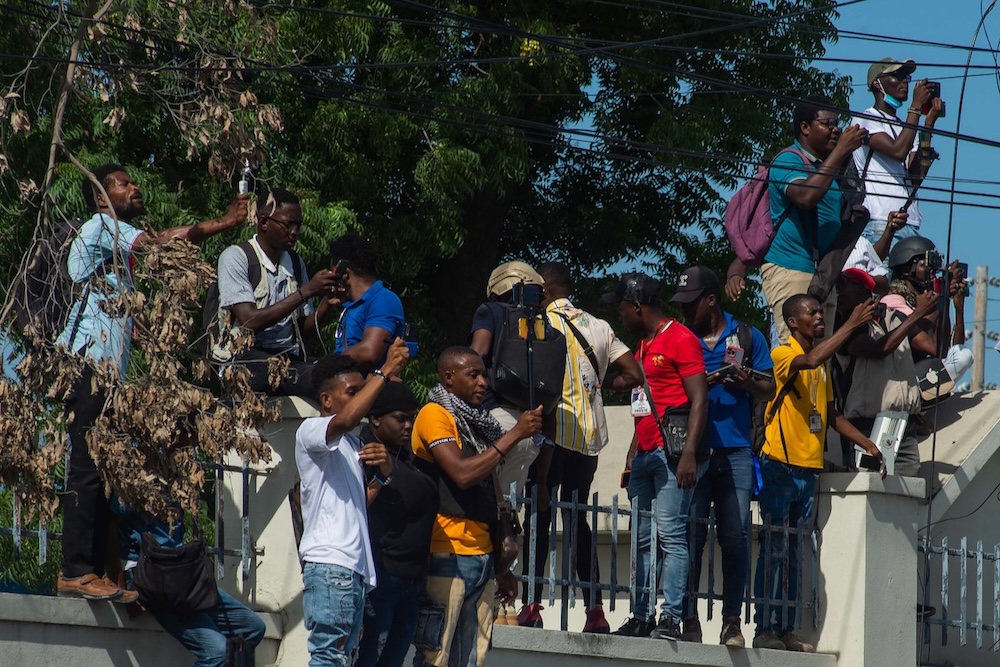

 Seeing a bird like this is incredibly rare (Picture: Andy Turner/BNPS)
Seeing a bird like this is incredibly rare (Picture: Andy Turner/BNPS)







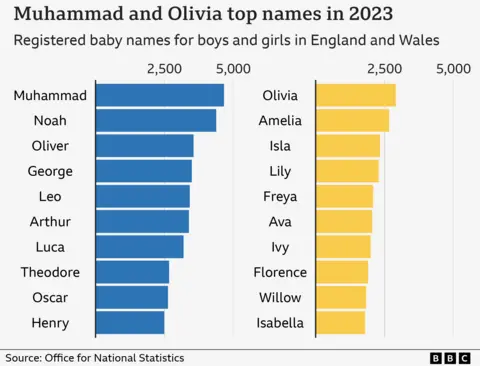

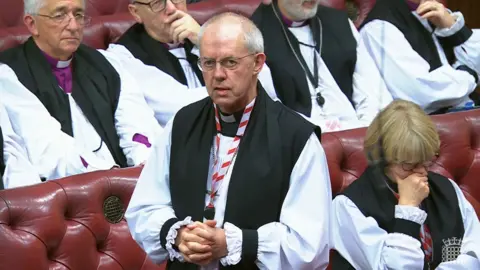



 Border Patrol agent apprehends undocumented immigrants shortly after they crossed the border from Mexico into the United States in 2018. Photo: Loren Elliott, AFP
Border Patrol agent apprehends undocumented immigrants shortly after they crossed the border from Mexico into the United States in 2018. Photo: Loren Elliott, AFP